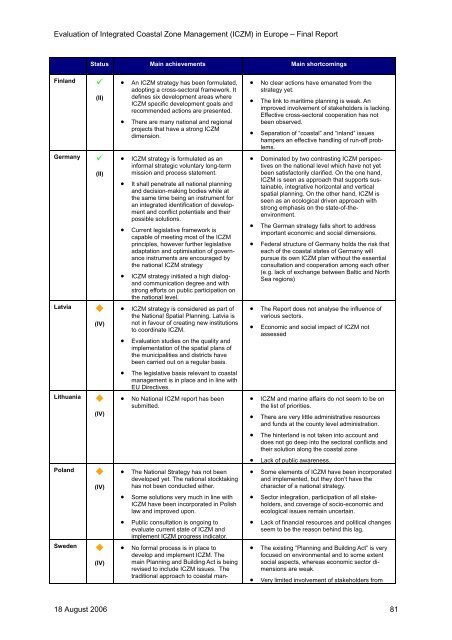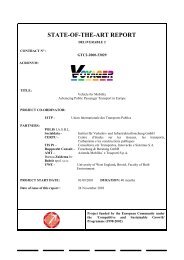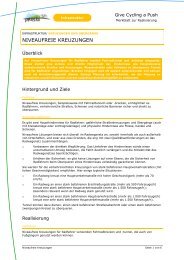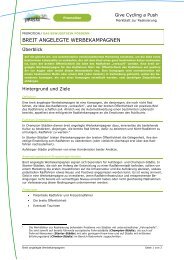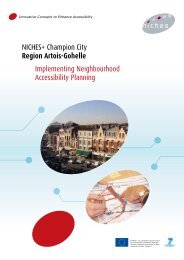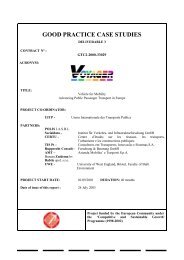Evaluation of Integrated Coastal Zone Management (ICZM) in ...
Evaluation of Integrated Coastal Zone Management (ICZM) in ...
Evaluation of Integrated Coastal Zone Management (ICZM) in ...
Create successful ePaper yourself
Turn your PDF publications into a flip-book with our unique Google optimized e-Paper software.
<strong>Evaluation</strong> <strong>of</strong> <strong>Integrated</strong> <strong>Coastal</strong> <strong>Zone</strong> <strong>Management</strong> (<strong>ICZM</strong>) <strong>in</strong> Europe – F<strong>in</strong>al Report<br />
Status Ma<strong>in</strong> achievements Ma<strong>in</strong> shortcom<strong>in</strong>gs<br />
F<strong>in</strong>land<br />
Germany<br />
Latvia<br />
<br />
(II)<br />
<br />
(II)<br />
<br />
(IV)<br />
• An <strong>ICZM</strong> strategy has been formulated,<br />
adopt<strong>in</strong>g a cross-sectoral framework. It<br />
def<strong>in</strong>es six development areas where<br />
<strong>ICZM</strong> specific development goals and<br />
recommended actions are presented.<br />
• There are many national and regional<br />
projects that have a strong <strong>ICZM</strong><br />
dimension.<br />
• <strong>ICZM</strong> strategy is formulated as an<br />
<strong>in</strong>formal strategic voluntary long-term<br />
mission and process statement.<br />
• It shall penetrate all national plann<strong>in</strong>g<br />
and decision-mak<strong>in</strong>g bodies while at<br />
the same time be<strong>in</strong>g an <strong>in</strong>strument for<br />
an <strong>in</strong>tegrated identification <strong>of</strong> development<br />
and conflict potentials and their<br />
possible solutions.<br />
• Current legislative framework is<br />
capable <strong>of</strong> meet<strong>in</strong>g most <strong>of</strong> the <strong>ICZM</strong><br />
pr<strong>in</strong>ciples, however further legislative<br />
adaptation and optimisation <strong>of</strong> governance<br />
<strong>in</strong>struments are encouraged by<br />
the national <strong>ICZM</strong> strategy<br />
• <strong>ICZM</strong> strategy <strong>in</strong>itiated a high dialogand<br />
communication degree and with<br />
strong efforts on public participation on<br />
the national level.<br />
• <strong>ICZM</strong> strategy is considered as part <strong>of</strong><br />
the National Spatial Plann<strong>in</strong>g. Latvia is<br />
not <strong>in</strong> favour <strong>of</strong> creat<strong>in</strong>g new <strong>in</strong>stitutions<br />
to coord<strong>in</strong>ate <strong>ICZM</strong>.<br />
• <strong>Evaluation</strong> studies on the quality and<br />
implementation <strong>of</strong> the spatial plans <strong>of</strong><br />
the municipalities and districts have<br />
been carried out on a regular basis.<br />
• The legislative basis relevant to coastal<br />
management is <strong>in</strong> place and <strong>in</strong> l<strong>in</strong>e with<br />
EU Directives.<br />
• No clear actions have emanated from the<br />
strategy yet.<br />
• The l<strong>in</strong>k to maritime plann<strong>in</strong>g is weak. An<br />
improved <strong>in</strong>volvement <strong>of</strong> stakeholders is lack<strong>in</strong>g.<br />
Effective cross-sectoral cooperation has not<br />
been observed.<br />
• Separation <strong>of</strong> “coastal” and “<strong>in</strong>land” issues<br />
hampers an effective handl<strong>in</strong>g <strong>of</strong> run-<strong>of</strong>f problems.<br />
• Dom<strong>in</strong>ated by two contrast<strong>in</strong>g <strong>ICZM</strong> perspectives<br />
on the national level which have not yet<br />
been satisfactorily clarified. On the one hand,<br />
<strong>ICZM</strong> is seen as approach that supports susta<strong>in</strong>able,<br />
<strong>in</strong>tegrative horizontal and vertical<br />
spatial plann<strong>in</strong>g. On the other hand, <strong>ICZM</strong> is<br />
seen as an ecological driven approach with<br />
strong emphasis on the state-<strong>of</strong>-theenvironment.<br />
• The German strategy falls short to address<br />
important economic and social dimensions.<br />
• Federal structure <strong>of</strong> Germany holds the risk that<br />
each <strong>of</strong> the coastal states <strong>of</strong> Germany will<br />
pursue its own <strong>ICZM</strong> plan without the essential<br />
consultation and cooperation among each other<br />
(e.g. lack <strong>of</strong> exchange between Baltic and North<br />
Sea regions)<br />
• The Report does not analyse the <strong>in</strong>fluence <strong>of</strong><br />
various sectors.<br />
• Economic and social impact <strong>of</strong> <strong>ICZM</strong> not<br />
assessed<br />
Lithuania<br />
<br />
(IV)<br />
• No National <strong>ICZM</strong> report has been<br />
submitted.<br />
• <strong>ICZM</strong> and mar<strong>in</strong>e affairs do not seem to be on<br />
the list <strong>of</strong> priorities.<br />
• There are very little adm<strong>in</strong>istrative resources<br />
and funds at the county level adm<strong>in</strong>istration.<br />
• The h<strong>in</strong>terland is not taken <strong>in</strong>to account and<br />
does not go deep <strong>in</strong>to the sectoral conflicts and<br />
their solution along the coastal zone<br />
• Lack <strong>of</strong> public awareness.<br />
• Some elements <strong>of</strong> <strong>ICZM</strong> have been <strong>in</strong>corporated<br />
and implemented, but they don’t have the<br />
character <strong>of</strong> a national strategy.<br />
• Sector <strong>in</strong>tegration, participation <strong>of</strong> all stakeholders,<br />
and coverage <strong>of</strong> socio-economic and<br />
ecological issues rema<strong>in</strong> uncerta<strong>in</strong>.<br />
• Lack <strong>of</strong> f<strong>in</strong>ancial resources and political changes<br />
seem to be the reason beh<strong>in</strong>d this lag.<br />
Poland<br />
<br />
(IV)<br />
• The National Strategy has not been<br />
developed yet. The national stocktak<strong>in</strong>g<br />
has not been conducted either.<br />
• Some solutions very much <strong>in</strong> l<strong>in</strong>e with<br />
<strong>ICZM</strong> have been <strong>in</strong>corporated <strong>in</strong> Polish<br />
law and improved upon.<br />
• Public consultation is ongo<strong>in</strong>g to<br />
evaluate current state <strong>of</strong> <strong>ICZM</strong> and<br />
implement <strong>ICZM</strong> progress <strong>in</strong>dicator.<br />
Sweden<br />
<br />
(IV)<br />
• No formal process is <strong>in</strong> place to<br />
develop and implement <strong>ICZM</strong>. The<br />
ma<strong>in</strong> Plann<strong>in</strong>g and Build<strong>in</strong>g Act is be<strong>in</strong>g<br />
revised to <strong>in</strong>clude <strong>ICZM</strong> issues. The<br />
traditional approach to coastal man-<br />
• The exist<strong>in</strong>g ”Plann<strong>in</strong>g and Build<strong>in</strong>g Act” is very<br />
focused on environmental and to some extent<br />
social aspects, whereas economic sector dimensions<br />
are weak.<br />
• Very limited <strong>in</strong>volvement <strong>of</strong> stakeholders from<br />
18 August 2006 81


